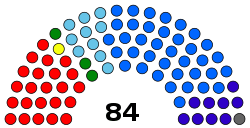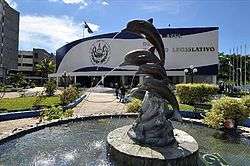Legislative Assembly of El Salvador
The Legislative Assembly (Spanish: Asamblea Legislativa) is the legislative branch of the government of El Salvador.
Legislative Assembly of the Republic of El Salvador Asamblea Legislativa de la República de El Salvador | |
|---|---|
 | |
| Type | |
| Type | |
| History | |
| Founded | 1824[1] |
| Leadership | |
| Structure | |
| Seats | 84 Deputies |
 | |
Political groups | |
| Elections | |
Last election | 4 March 2018 |
Next election | 2021 |
| Meeting place | |
 | |
| San Salvador | |
| Website | |
| www | |
 |
|---|
| This article is part of a series on the politics and government of El Salvador |
|
Executive |
|
Legislature
|
|
Administrative divisions |
|
|
|
|
Structure
The Salvadoran legislature is a unicameral body. It is made up of 84 deputies, all of whom are elected by direct popular vote according to open-list proportional representation to serve three-year terms and are eligible for immediate re-election. Of these, 64 are elected in 14 multi-seat constituencies, corresponding to the country's 14 departments, which return between 3 and 16 deputies each. The remaining 20 deputies are selected on the basis of a single national constituency.
To be eligible for election to the Assembly, candidates must be (Art. 126, Constitution):
- Older than 25.
- Salvadoran citizens by birth, born of either a Salvadoran father or a Salvadoran mother.
- Of recognised honesty and education.
- Not have had the enjoyment of their rights as citizens cancelled in the previous five years.
Current Standing by Party
| Party / Group | Deputies | ||
|---|---|---|---|
| Nationalist Republican Alliance (ARENA) | 35 | ||
| Farabundo Martí National Liberation Front (FMLN) | 23 | ||
| Grand Alliance for National Unity (GANA) | 10 | ||
| National Concertation Party (PCN) | 9 | ||
| Christian Democratic Party (PDC) | 3 | ||
| Nuevas Ideas (NUEVAS IDEAS) | 0 | ||
| Source: Salvadoran Legislative Assembly | |||
Deputies
ARENA (35)
- Ricardo Velásquez Parker
- Norman Quijano
- Alberto Romero
- Mario Marroquín
- Patricia Valdivieso
- Emilio Corea
- Josue Godoy
- Rosa Romero
- Donato Vaquerano
- Mayte Iraheta
- Mauricio Vargas
- Javier Palomo
- Mariano Blanco
- Arturo Magaña
- Mario Martínez
- Jorge Rosales
- Andrés Hernández
- Portillo Cuadra
- Ricardo Godoy
- Edgar Escolan
- Bonner Jimenez
- Marcela Villatoro
- Mauricio Linares
- Felissa Cristales
- Rodrigo Avila
- Carlos Reyes
- Julio Fabián
- Margarita Escobar
- Martha Batres
- David Reyes
- Orlando Candray
- Lucia De León
- Silvia Ostorga
- Alejandrina Castro
- Karla Hernández
FMLN (23)
- Schafik Handal
- Nidia Díaz
- Lucia Baires
- Catalino Castillo
- Daniel Reyes
- Dina Argueta
- Audelia López
- Milton Garay
- Guisela Herrera
- Anabel Belloso
- Jaime Sandoval
- Elizabeth Gómez
- Rina Araujo
- Rodolfo Martínez
- Javier Valdez
- Alma Cruz
- Margarita López
- Carlos Ruiz
- Karina Sosa
- Damian Alegria
- Maniel Flores
- Yanci Urbina
- Cristina Cornejo
GANA (10)
- Guillermo Gallegos
- Numan Salgado
- Osiris Luna
- Francis Zablah
- Juan C. Mendoza
- Adelmo Rivas
- Rigoberto Soto
- Lorenzo Rivas
- Mario Tenorio
- Guadalupe Vásquez
PCN (9)
- Mario Ponce
- Luis Urías
- Reinaldo Cardoza
- Beltrhan Bonilla
- Eeileen Romero
- Roberto Ángulo
- Antonio Armendáriz
- Francisco Merino
- Serafin Orantes
PDC (3)
- Rodolfo Parker
- Reinaldo Carballo
- Jorge Mazariego
CD (1)
- Juan Martel
Independent (3)
- Roberto Bonilla
- Milena Mayorga
- Rene Gustavo Escalante
Election results
Results
| Party | Votes | % | Seats | +/– |
|---|---|---|---|---|
| Nationalist Republican Alliance | 823,198 | 42.34 | 37 | +5 |
| Farabundo Martí National Liberation Front | 475,265 | 24.44 | 23 | –8 |
| Grand Alliance for National Unity | 222,548 | 11.45 | 10 | -1 |
| National Coalition Party | 209,576 | 10.78 | 9 | +4 |
| Christian Democratic Party | 61,604 | 3.17 | 3 | +2 |
| ARENA–PCN | 24,325 | 1.25 | 1 | +1 |
| FMLN–CD | 22,899 | 1.18 | 0 | – |
| PDC–PCN | 20,808 | 1.07 | 0 | – |
| Salvadoran Patriotic Brotherhood | 18,062 | 0.93 | 0 | New |
| Democratic Change | 17,503 | 0.90 | 1 | +1 |
| Social Democratic Party | 13,717 | 0.71 | 0 | 0 |
| FMLN–PSD | 11,123 | 0.57 | 0 | – |
| FMLN–PSD–CD | 10,716 | 0.55 | 0 | – |
| Independents | 12,998 | 0.67 | 1 | +1 |
| Invalid/blank votes | 178,538 | – | – | – |
| Total | 84 | 0 | ||
| Registered voters/turnout | – | – | ||
| Source: TSE, El Salvador | ||||
Other parliamentary bodies
El Salvador also returns 20 deputies to the supranational Central American Parliament, also elected according to closed-list proportional representation from a single national constituency.
See also
References
- Breve historia de la Asamblea Legislativa de la República de El Salvador
- Luis Eliezer Garcia. "Ministerio de Relaciones Exteriores de El Salvador » Autoridades » Titulares". Rree.gob.sv. Retrieved 2019-07-10.
External links
- Official website (in Spanish)
.svg.png)